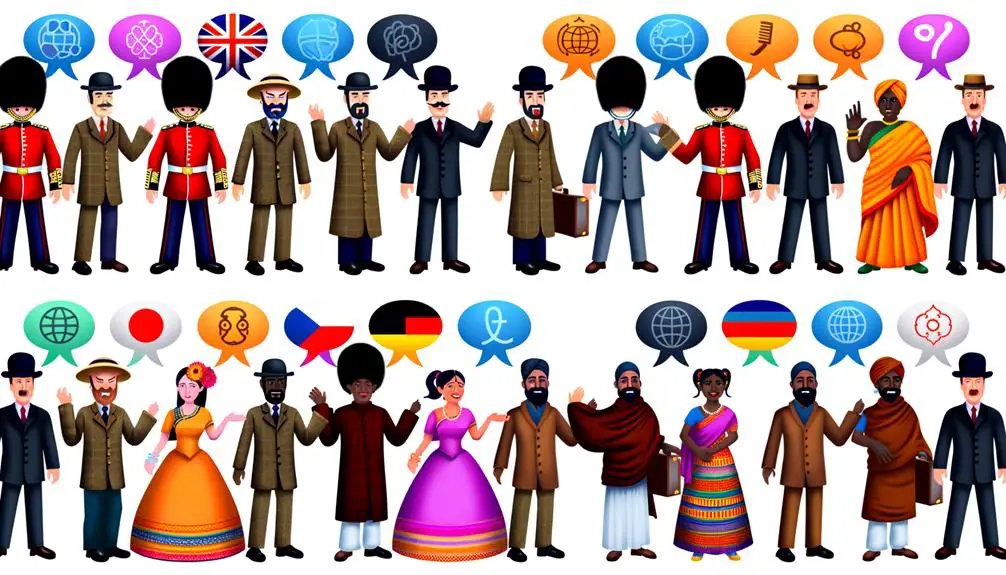In British slang, "ping" signifies quick and efficient communication, stemming from its onomatopoeic origins and adoption during World War II for radar and sonar detection. Its evolution into everyday speech reflects significant technological and societal shifts, embedding itself in digital interaction practices. As a multifaceted verb, "ping" encompasses nuances in various contexts—texting, gaming, social media, and professional emails—highlighting its adaptability and the importance of understanding its etiquette. The term's widespread use underscores technological integration in language, suggesting an ongoing evolution in response to new communication landscapes. Further exploration reveals deeper layers of "ping's" significance and versatility.
Key Takeaways
- 'Ping' in British slang primarily refers to sending a quick and sharp digital message or notification.
- It originated from an onomatopoeic sound, indicating something fast or sudden, especially in military and technological contexts.
- The term is widely used in casual conversations, online gaming, social media, and professional emails.
- 'Ping' reflects the speed and efficiency of modern communication, highlighting technological advancements.
- Understanding ping etiquette is crucial, as it can convey connectivity, urgency, or impatience depending on the context.
Origins of 'Ping'

The term 'ping' in British slang originated from the onomatopoeic sound that mimics the noise of something fast or sudden, reflecting its usage to denote quick and sharp communication or detection. This lexical choice isn't arbitrary but deeply rooted in both military origins and technological adaptation, illustrating a fascinating journey from specific, functional use to broader, colloquial applications in everyday language.
Delving into its military origins, 'ping' was initially employed during World War II, specifically in the context of radar and sonar technology. The military utilized the term to describe the sound emitted by sonar equipment when it detects another object, such as a submarine or ship. This sound, a sharp and clear 'ping,' was important for navigation and warfare strategies, enabling forces to locate and engage with enemy vessels with remarkable precision. The term's shift from a strictly military vernacular to general public usage underscores the impact of technological advancements on language evolution.
Furthermore, the technological adaptation of 'ping' extends beyond its military utility. In the post-war era, as radar and sonar technologies became more integrated into civilian life, the term 'ping' found new relevance. It began to symbolize rapid electronic communication, mirroring the instantaneous nature of modern digital interactions. This adaptation from a specific, operational context to a metaphor for speedy information exchange highlights the dynamic nature of language, particularly how terms can evolve and adapt to new technological landscapes.
Hence, the etymology of 'ping' in British slang encapsulates a rich history of linguistic adjustment, demonstrating how words can shift from specialized jargon to everyday language.
Primary Meanings

In British slang, 'ping' primarily conveys the idea of quick, sharp communication or detection, reflecting its technological and military roots. This word's journey from a specific, technical term to a widely recognized element of casual conversation illustrates the dynamic nature of language and the influence of societal changes on the evolution of slang. The primary meanings of 'ping' encapsulate the rapidity and efficiency inherent in modern communication, underscoring the societal shift towards faster, more immediate forms of interaction.
The phenomenon of 'ping' gaining popularity in everyday language isn't merely an incident of history but a reflection of evolving communication technologies and their integration into daily life. As digital communication platforms have proliferated, so too has the need for a vocabulary that captures the essence of instantaneity and precision these platforms provide. 'Ping,' with its connotations of speed and accuracy, fits neatly into this niche, bridging the gap between technical jargon and colloquial speech.
Moreover, the evolution of 'ping' within British slang underscores the adaptable nature of language, particularly how words can be repurposed and imbued with new meanings over time. Originally denoting a specific type of electronic signal, 'ping' has transcended its technological origins to become a metaphor for any swift, direct form of contact or awareness. This shift from a narrow, technical definition to a broader, more accessible one is indicative of how linguistic elements can be reshaped by their users, reflecting changes in technology, culture, and societal norms.
Usage in Conversations

Frequently, you'll find that 'ping' seamlessly integrates into everyday conversations, reflecting its widespread acceptance and utility in conveying immediate, concise communication. This term, deeply embedded in British slang, transcends its origins, evolving into a multifaceted verb that encapsulates the essence of quick, digital interaction. When you explore the nuances of using 'ping' in dialogues, an understanding of ping etiquette becomes paramount. This unwritten code dictates the appropriateness of its use, guiding speakers to navigate the fine line between informal immediacy and potential intrusion.
Analyzing the conversational deployment of 'ping' reveals its dual capability to foster connectivity and, paradoxically, to underscore urgency or impatience. You're engaging in a practice that, while seemingly benign, carries substantial emotional connotations. The context in which 'ping' is employed often dictates the emotional undertones it conveys. A simple 'I'll ping you later' can be perceived as a casual promise of future contact, yet, depending on the tone and preceding interaction, it might also hint at an expectation for swift response once the message is sent.
Understanding these subtleties is important. You're not merely using a slang term; you're invoking a complex interplay of social norms and expectations. The act of 'pinging' someone goes beyond the digital action—it's a social gesture that navigates the domains of urgency, expectation, and the implicit understanding of digital communication's immediacy. Mastering the use of 'ping' in conversations isn't just about linguistic competence but also about social adeptness and sensitivity to the nuances of contemporary communication.
Variations and Context

You need to grasp the subtle nuances of 'Ping' to fully appreciate its versatility in British slang. Analyzing common usage scenarios reveals how context transforms its meaning, while an exploration of regional interpretation differences showcases the word's adaptability across the UK.
This investigation not only enriches your understanding but also highlights the dynamic nature of slang in linguistic evolution.
Understanding "Ping" Nuances
Delving into the nuances of 'ping' within British slang reveals a spectrum of meanings influenced by context and variation. The term's ping connotations vary considerably, often carrying emotional implications that are subtle yet impactful.
When you unpack 'ping,' you're not just encountering a word; you're engaging with a linguistic tool that shapes emotional landscapes. Its usage might imply a sudden realization, a quick communication, or even an emotional jolt, depending on the surrounding discourse.
Understanding these nuances requires a keen sense of linguistic sensitivity. The emotional weight 'ping' can carry isn't to be underestimated—it can transform a casual conversation into a moment of profound connection or realization, showcasing the power of context in interpreting slang.
Common Usage Scenarios
In exploring the common usage scenarios of 'ping' within British slang, one discovers its application varies greatly across different contexts, each embodying distinct emotional and communicative nuances. The term infiltrates various spheres of communication, adhering to an unwritten 'ping etiquette' that users intuitively navigate. Its versatility is apparent in:
- Text messaging, as a nudge for attention or response.
- Online gaming references, indicating latency or to invite for a game.
- Social media interactions, suggesting a quick check-in or share.
- Professional emails, as a gentle reminder or prompt.
- Casual conversation, signaling to bring up a new topic or switch subjects.
This analysis highlights 'ping's' multifaceted role in facilitating digital and verbal communication, underscoring the importance of context in interpreting its intended meaning.
Regional Interpretation Differences
While exploring 'ping' in British slang reveals its versatile use across various communication platforms, understanding its regional interpretations exposes another layer of complexity in its application and perception. The term's adaptability is rooted in dialectical variations, which contribute notably to its linguistic evolution.
| Region | Interpretation |
|---|---|
| Northern England | Quick notification |
| London | Sending a message |
| Scotland | Alert or alarm sound |
This table illustrates how 'ping' acquires unique connotations based on regional dialects. In Northern England, it often refers to a swift notification, perhaps due to the fast-paced communication style prevalent there. Londoners might use it when referring to the act of sending a digital message. Meanwhile, in Scotland, 'ping' might evoke the idea of an alert or alarm sound, highlighting a more cautionary use of the term. These regional nuances underscore the rich tapestry of British slang and its continuous evolution.
Cultural Impact

The term 'ping' has permeated various aspects of British culture, substantially influencing language use in social interactions and digital communication. Its roots in British slang showcase not only the dynamic nature of language but also underscore the rapid pace of slang evolution in the digital era. The global influence of British culture, particularly through media, music, and internet memes, has facilitated the adoption of 'ping' beyond the UK, making it a recognizable piece of vernacular worldwide.
- Widespread Use in Digital Platforms: 'Ping' has become a staple in the lexicon of digital natives, often used to describe the act of sending a quick message or notification.
- Influence on Popular Media: Its adoption in TV shows, movies, and online content has cemented its place in contemporary British culture.
- Shift in Language Patterns: The term reflects broader trends in slang evolution, where digital communication influences the creation and spread of new slang.
- Impact on Social Interaction: 'Ping' illustrates how slang terms can encapsulate specific cultural behaviors, in this case, the immediacy and brevity valued in modern communication.
- Reflection of Technological Integration: The term's origin and usage highlight the seamless integration of technology into everyday life, influencing how people connect and interact.
Analyzing the cultural impact of 'ping' offers insights into the mechanisms of slang evolution and the role of language in reflecting and shaping societal norms and behaviors. Its journey from niche usage to widespread recognition exemplifies the power of language to evolve and adapt in response to changing social and technological landscapes.
Comparisons With Other Slang

Exploring how 'ping' compares with other slang expressions reveals the unique pathways through which language evolves in response to societal and technological changes. As you investigate slang evolution, you'll notice that 'ping's' emergence as a term isn't an isolated phenomenon. Instead, it's part of a broader trend where digital culture seeps into everyday lexicon, illustrating a fascinating aspect of global comparisons in slang development.
In the domain of slang evolution, 'ping' stands out for its technological roots, mirroring terms like 'ghosting' or 'phubbing,' which also derive from the digital age's social dynamics. However, 'ping' carries a distinct, almost onomatopoeic quality that sets it apart. This quality enhances its adaptability across different contexts, making it a prime example of how specific social and technological contexts shape slang.
Global comparisons further illuminate 'ping's' unique position. For instance, while American slang often embraces technological terms, such as 'text' as a verb, British slang like 'ping' frequently integrates these elements with a distinctive local flair, reflecting the UK's particular blend of linguistic tradition and innovation. This juxtaposition highlights the nuanced ways in which English-speaking cultures adopt and adapt technological terms into their slang, offering insights into their respective societal attitudes towards technology and communication.
Through analyzing 'ping' alongside other slang expressions, it becomes evident that slang evolution isn't merely about the words themselves but about the stories they tell us regarding cultural adaptation, technological integration, and global interconnectedness.
Tips for Using 'Ping'

Understanding the nuances of using 'ping' in conversation requires a grasp of its context-dependent meanings and the subtleties of its application in various social scenarios. When incorporated adeptly, 'ping' can enrich communication, especially in areas where immediacy or electronic implications are inferred. However, to maintain clarity and prevent misunderstandings, it's vital to adhere to certain principles of ping etiquette.
- Consider the platform: The acceptability and interpretation of 'ping' can vary across different communication platforms. In more formal or professional settings, its use might be frowned upon or misunderstood.
- Gauge the relationship: Familiarity and the nature of your relationship with the recipient play an essential role. Using 'ping' with close friends in casual conversation is more acceptable than in communications with someone in a formal context.
- Clarity is key: Make sure that the context of 'ping' is clear to the recipient. Misinterpretation can lead to confusion, especially with the electronic implications of expecting an immediate response.
- Tone matters: The perceived tone of 'ping' can convey urgency, informality, or a casual nudge. It's important to match this with the intended message.
- Be mindful of frequency: Overuse of 'ping' can dilute its effectiveness and become annoying. Use it sparingly to maintain its impact.
Adhering to these principles ensures that your use of 'ping' is both effective and respectful, enhancing communication rather than hindering it. Understanding and applying these tips will enrich your conversational dynamics, especially in an era where electronic communication is prevalent.
Future of 'Ping' in Slang

As linguistic evolution continues, you'll find 'ping' adapting to new technological and social landscapes, potentially expanding its usage and meanings in contemporary slang. The term, historically rooted in both technological and social contexts, is poised for further transformation in the face of rapid digital evolution. You're observing not just a word but a linguistic phenomenon, reflecting broader changes in communication practices.
With the acceleration of digital evolution, 'ping' could evolve beyond its current connotations. As technology permeates deeper into daily life, new forms of interaction and connectivity emerge, likely influencing the trajectory of 'ping' within the lexicon of slang. You're witnessing a term that, originally technical, has seamlessly switched into casual vernacular, indicating its versatility and adaptability. This adaptability suggests that 'ping' won't only endure but also expand its reach and significance in slang.
Furthermore, slang globalization plays an important role in the future of 'ping.' As English slang crosses geographical and cultural boundaries through digital media, 'ping' has the potential to adopt new meanings and uses, influenced by its interaction with other languages and cultures. You're looking at a term that could embody a unique blend of global and local linguistic trends, illustrating the complex dynamics of language evolution in a connected world.
Frequently Asked Questions
How Does the Slang Term 'Ping' Reflect Generational Differences in Language Use Within the Uk?
You're exploring how linguistic evolution showcases generational shifts in the UK, particularly through slang. The term 'ping' exemplifies this dynamic, reflecting not only cultural differences but also how language adapts over time.
It's essential to analyze the contexts in which younger and older generations use slang, as this reveals broader trends in linguistic change. This analysis uncovers the intricate interplay between language, identity, and culture, illustrating the fluid nature of communication.
Are There Any Notable Public Figures or Celebrities Who Have Popularized the Term 'Ping' in Recent Years?
Diving into the linguistic whirlpool, you'll find 'ping' has echoed through the halls of modern vernacular, largely thanks to celebrity endorsements. While pinpointing a single confirmation remains elusive, the term's proliferation can't be detached from the limelight's influence.
High-profile figures, spanning entertainment to politics, have inadvertently or deliberately woven 'ping' into their digital and verbal tapestries, amplifying its reach. This celebrity amplification serves as a confirmation to 'ping's' origins and evolving journey through language.
How Does the Use of 'Ping' in Digital Communication Platforms Differ From Its Verbal Usage Among British Youth?
In digital communication platforms, 'ping' has evolved, reflecting technological evolution and digital etymology.
Unlike its verbal usage among British youth, which often conveys a quick, casual interaction, in digital contexts, it typically signifies sending a message or alert.
This shift highlights the adaptability of slang within the digital sphere. You're witnessing language morph as technology reshapes how we communicate, making 'ping' more formal and targeted in digital environments than in spoken slang.
What Are the Psychological Effects of Using Slang Like 'Ping' on Interpersonal Communications and Relationships?
Diving into the heart of it, when you weave slang like 'ping' into your chats, it's more than a manifestation to slang evolution. Yet, here's the rub: this linguistic shift can erect communication barriers, subtly altering the fabric of interpersonal relationships.
Analytically, it's clear that such slang use can both enrich and complicate dialogues, molding perceptions and potentially straining connections in ways that are intricate and profound.
How Has the Global Spread of Internet Culture Influenced the Adoption of British Slang Terms Like 'Ping' in Non-English Speaking Countries?
The worldwide spread of internet culture has notably influenced the adoption of British slang, like 'ping', in non-English speaking countries. This globalization impact reflects a broader cultural identity shift, where you're witnessing a blend of local and foreign linguistic elements.
It's not just about picking up new words; it's about how these terms reshape communication patterns and cultural identities, integrating global influences into your daily interactions and expressions in a nuanced, yet profound way.
Conclusion
In the ever-evolving lexicon of British slang, 'ping' has ricocheted from its technological origins to embody a broader spectrum of communication nuances. Like a stone skipping across the linguistic waters, its impact resonates in concentric circles, influencing conversations with its versatility and simplicity.
As you navigate the dynamic terrains of colloquial speech, let 'ping' serve as a linguistic compass, guiding your interactions with precision and brevity.
In the grand tapestry of slang, 'ping' weaves itself as a thread of connectivity, emblematic of the fluidity and adaptability of language itself.







